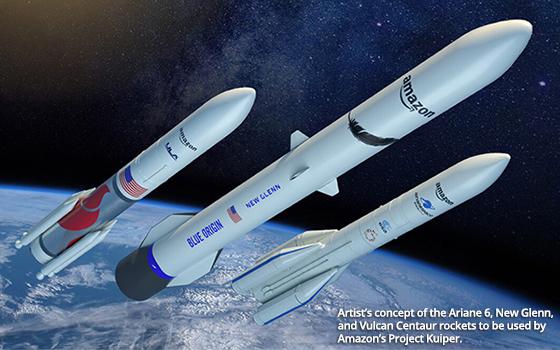
Amazon on Tuesday announced the
largest commercial space launch deal ever, securing agreements with Arianespace, Blue Origin, and United Launch Alliance (ULA) to provide heavy-lift launch services for Project
Kuiper.
Project Kuiper is Amazon’s initiative to increase global broadband access using a constellation of satellites in low Earth orbit (LEO).
“These launch agreements
reflect our incredible belief in Project Kuiper, and we’re proud to be working with such an impressive lineup of partners to deliver on our mission,” stated Amazon Senior Vice President
Dave Limp, who oversees Amazon Devices and Services. “Securing launch capacity from multiple providers reduces scheduling risk and helps us secure competitive, long-term pricing that we can pass
on to Project Kuiper customers as cost savings.”
advertisement
advertisement
The contracts, 83 launches in aggregate for a five-year period, provides the capacity for Amazon to deploy the majority of its
3,236-satellite constellation. It is the largest commercial procurement of launch vehicles in history.
Arianespace will support 18 launches of Europe's new Ariane 6 rocket. Blue Origin will
support 12 launches of the company's New Glenn rocket, with options for 15 additional launches. United Launch Alliance will support 38 launches of the company's Vulcan rocket.
I live amidst
nature for most of the year on several acres in the middle of nowhere, in a gorgeous area of Wyoming. Well, at least I think it's the middle of nowhere, coming from southern California.
Internet access in my home isn't a problem. We spent thousands of dollars to ensure I could work from home and access anything online or stream audio and video without a problem. But step away from
the house and internet access disappears, along with AT&T cell service at times in areas.
Many of the businesses around here do not have a website. They rely on Facebook to connect
online with consumers.
Amazon’s Project Kuiper aims to provide high-speed, low-latency broadband to a wide range of customers, such as individual households, schools, hospitals,
businesses, government agencies, disaster relief operations, mobile operators, and other organizations working in places without reliable internet connectivity.
Designing and developing the
entire system in-house, Amazon combined a constellation of advanced LEO satellites with small, affordable customer terminals and a secure, resilient ground-based communications network.
Amazon Web Services also plays a role in this. Project Kuiper will
leverage Amazon’s global logistics and operations footprint, as well as Amazon Web Services’ networking and infrastructure, to serve a diverse, global customer base.
Project Kuiper will also apply Amazon’s experience producing low-cost devices and services like Echo and Kindle to deliver service at what the company calls affordable prices for
customers.
Investments in Project Kuiper also supports thousands of suppliers and skilled jobs in 49 U.S. states and 13 European countries, according to Amazon.
The contract with ULA,
for example, also covers production and launch infrastructure to support more launches, timed closer together, at the Cape Canaveral Space Force Station. That work includes a new, dedicated version of
the Vulcan Launch Platform.